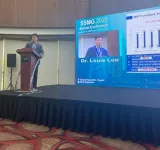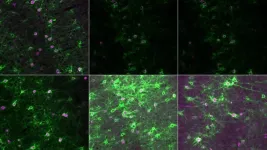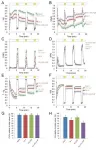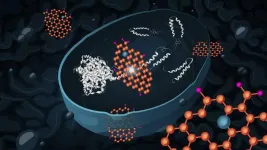(Press-News.org) Dads can suffer from postpartum depression, and a new pilot study at the University of Illinois Chicago suggests they can and should be screened for the condition. Given the intertwined effects of mothers’ and fathers’ physical and mental health, addressing the health of fathers may be a powerful untapped tool in improving the nation’s ongoing maternal health crisis.
The researchers got mothers’ permission to interview and screen 24 dads, 30% of whom screened positive for postpartum depression on the same tool that is commonly used to screen moms. Lead author Dr. Sam Wainwright said this points to the importance of asking new dads how they’re doing.
“A lot of dads are stressed. They’re scared. They’re struggling with balancing work and parental and partner responsibilities,” he said. “Men are often not doing well, but no one is asking them about it.”
Talking to new dads about their mental health takes on additional importance when considering how it can impact their partners’ health.
“A woman at risk for postpartum depression is much more likely to get postpartum depression if she has a depressed partner,” said Wainwright, assistant professor of internal medicine and pediatrics.
Other studies have estimated that 8% to 13% of new fathers have postpartum depression. Wainwright suspects this study’s rate was higher because nearly 90% of the participants identified as being from a racial or ethnic group that faces issues of structural racism and social determinants that can worsen mental health.
The study, published in the journal BMC Pregnancy and Childbirth, was conducted at UI Health’s Two-Generation Clinic. Opened in 2020, the clinic grew out of the understanding that new mothers, especially low-resource mothers of color who are taking on parenthood alongside a host of structural challenges often do not prioritize their own health care. However, they are often very diligent in bringing their children to the doctor, Wainwright explained. The Two-Generation Clinic capitalizes on children’s visits by offering moms primary care at the same time.
Yet, dads were often left out of this process. Members of the clinic team began chatting with dads to see how they were doing. Wainwright said they’d often hear comments such as, “I’m really stressed, but I don’t want my partner to know because I’m here to support her.” This study grew out of those conversations.
Those conversations also spurred a larger research project that Wainwright has begun to learn more about the experiences of dads, especially as related to their mental and physical health. Perhaps well-baby visits aren’t the only place to reach dads, he said, so he’s started talking to fathers-to-be in the obstetrics waiting area, too. He’s also asking to screen dads for conditions like high blood pressure during these conversations.
The medical world struggles to connect with young men, who often aren’t eager to see a doctor, Wainwright said, so reaching them as they enter fatherhood presents an important opportunity. In fact, some of the men in the postpartum depression study who did not have a primary care physician are now seeing Wainwright for medical care, and others requested mental health services.
The overarching goal of this line of research is to better understand how to help men stay healthy so that their relationships and families are healthy, too, Wainwright explained.
“How can we show them that it’s important to take care of yourself for the sake of your baby, for the sake of your partner and for your own sake?” he said.
The other authors on the study, all of whom are from UIC, are Rachel Caskey, Aida Rodriguez, Abigail Holicky, Dr. Melissa Wagner-Schuman, and Anne Elizabeth Glassgow.
Written by Emily Stone
END
Should fathers be screened for postpartum depression?
2023-10-04
ELSE PRESS RELEASES FROM THIS DATE:
BGI Genomics breaks new ground in Saudi Arabian precision medicine
2023-10-04
The Saudi Society of Medical Genetics Annual Conference 2023 was held in Riyadh, Saudi Arabia, on September 29-30, 2023. As the most authoritative academic conference on precision medicine in the Kingdom, this conference attracted global experts worldwide.
One of the highlights of the conference was the presentation entitled "Spatial-temporal sequencing and some large-scale application of precision medicine technologies," delivered by Dr. Louis (Renyuan) Luo, VP of BGI Genomics West Asia, at the invitation of the Saudi Society of Medical Genetics.
Dr. Luo's presentation discussed the importance of spatiotemporal sequencing technology ...
Portable laboratory devices can detect SARS-CoV-2
2023-10-04
Washington, D.C. — A new study has demonstrated rapid and sensitive on-site detection of SARS-CoV-2 RNA from environmental surfaces using a portable laboratory device. The study was published in Microbiology Spectrum, a journal of the American Society for Microbiology.
“Our findings hold promising implications for scenarios where access to testing laboratories is challenging, such as in cruise ships, international travel, remote islands and tourist destinations,” said lead study author Kouichi Kitamura, Ph.D., National Institute of Infectious ...
Challenges in acute heart attack care continue post COVID-19
2023-10-04
A door-to-balloon (D2B) time of 90-minutes or less is associated with improved outcomes for heart attack patients. However, during the COVID-19 pandemic certain obstacles—including the need for COVID-19 screening, associated isolation procedures and terminal cleaning in the cardiac cath lab—led to increased D2B times. According to a new study, presented at the American College of Cardiology (ACC) Quality Summit 2023, many health care facilities are still recovering from the pandemic and facing new challenges, causing D2B times to continue to lag.
A myocardial infarction, or heart attack, occurs when there has been a blockage ...
Researchers design potential therapy to prevent brain deterioration in children with rare genetic conditions
2023-10-04
Francis Crick Institute press release
Under strict embargo: 14:00 BST / 09:00hrs ET Wednesday 4 October 2023
Peer reviewed
Observational and experimental studies
People and cells
A research team at the Francis Crick Institute and Great Ormond Street Hospital (GOSH)/UCL Great Ormond Street Institute of Child Health have identified new potential treatments for children with rare genetic conditions of blood vessels, which cause severe, lifelong, and disabling symptoms like seizures and impaired development.
Through two papers published today in the Journal of Investigative ...
Reactivate, repurpose, and rewire the brain
2023-10-04
Developing brains become shaped by the sights, sounds, and experiences of early life. The brain’s circuits grow more stable as we age. However, some experiences later in life open up opportunities for these circuits to be rapidly rewired. New research from Cold Spring Harbor Laboratory Associate Professor Stephen Shea helps explain how the brain adapts during a critical period of adulthood: the time when new mothers learn to care for their young.
Shea’s work in mice shows how this learning process ...
American Society for Metabolic and Bariatric Surgery names new executive director after yearlong search
2023-10-04
After a yearlong and extensive nationwide search, the American Society for Metabolic and Bariatric Surgery (ASMBS), the nation’s largest professional organization of bariatric and metabolic surgeons and integrated health professionals, has named healthcare association veteran Diane M. Enos MPH, RDN, CAE, FAND, to serve as its new executive director.
Before joining ASMBS, Enos, a registered dietitian and certified association executive with a master’s degree in public health from the University of Texas Health Science Center in Houston, was Chief Learning Officer of the Academy of Nutrition and Dietetics, ...
Antibody therapy inspired by patient case reduced tau tangles in a preclinical model of Alzheimer’s disease
2023-10-04
A team led by researchers from Mass General Brigham reports promising results for a monoclonal antibody that takes aim at a new target for Alzheimer’s disease. Inspired by their previous identification of a genetic variant in the APOE gene that provides extreme resistance against Alzheimer’s disease, the team, which includes investigators from Mass Eye and Ear and Massachusetts General Hospital, developed a therapy that mimics the behavior of this genetic variant in a preclinical model, reducing ...
Demystifying the role of plant x- and y-type thioredoxins
2023-10-04
The potential for exposure to fluctuating light has necessitated that plants evolve protective mechanisms for when the light intensity exceeds photosynthetic capacity. Under these conditions, reactive oxygen species cause photoinhibition, which hinders photosynthetic efficiency. To counter this loss in photosynthetic efficiency, chloroplasts evolved thioredoxin (Trx) proteins that regulate redox balance within the photosynthetic apparatus and provide a photoprotective function. These proteins allow plants to modulate photosynthesis in response to variations in light intensity. ...
Graphene oxide reduces the toxicity of Alzheimer’s proteins
2023-10-04
A probable early driver of Alzheimer's disease is the accumulation of molecules called amyloid peptides. These cause cell death, and are commonly found in the brains of Alzheimer’s patients. Researchers at Chalmers University of Technology, Sweden, have now shown that yeast cells that accumulate these misfolded amyloid peptides can recover after being treated with graphene oxide nanoflakes.
Alzheimer’s disease is an incurable brain disease, leading to dementia and death, that causes suffering for both the patients and their ...
Avatars to help tailor glioblastoma therapies
2023-10-04
Scientists have created a new zebrafish xenograft platform to screen for novel treatments for an aggressive brain tumor called glioblastoma, according to a new study by the Gerhardt and De Smet labs published in EMBO Molecular Medicine.
Joint press release – Max Delbrück Center, VIB, and KU Leuven
Glioblastoma is an aggressive and difficult-to-treat brain tumor in adults. On average, patients survive for only 1.5 years. The standard of care treatment for this disease, which includes surgery followed by radiation and chemotherapy, has not changed in 18 years. That’s partly because the cancer is ...




